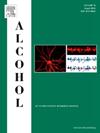解释纳曲酮治疗有酒精使用障碍家族史的酒精依赖患者的疗效增加:对奖励敏感性和甜味喜好作用的系统回顾。
IF 2.9
4区 医学
Q3 PHARMACOLOGY & PHARMACY
引用次数: 0
摘要
阳性的酒精使用障碍家族史(FHA+)是发生酒精使用障碍(AUD)的最强危险因素之一。重要的是,纳曲酮(NTX)治疗FHA+ AUD患者的疗效高于FHA- AUD患者。可能,这可以解释为高奖励敏感性的衰减和喜欢甜的物质(“喜欢甜”;FHA+ AUD患者的SL)。本系统综述探讨了NTX对奖励敏感性和SL的衰减是否解释了其在FHA+患者中比FHA- AUD患者疗效更高的原因。我们对NTX对FHA+ AUD患者的影响、NTX对奖励敏感性的影响、以及FHA+与奖励敏感性和SL的关联进行了单独的系统文献检索。总共纳入36项符合条件的研究(6项关于NTX对FHA+ AUD患者的影响,18项关于奖励敏感性,12项关于甜食喜好)。在6项研究中,有5项研究显示FHA+对AUD患者的NTX治疗效果有调节作用,FHA+ AUD患者的NTX疗效更高。在8项研究中的6项中,奖励敏感性减缓了NTX对AUD的治疗效果,在10项研究中的9项中,奖励敏感性被NTX减弱。在3项研究中,SL正调节了NTX在AUD中的作用。最后,在9项研究中的9项中,NTX减弱了SL,而阿片受体激动剂(部分)增强了SL。奖励敏感性的增加(以及对甜味的喜爱可能是其指标)似乎与FHA+呈正相关,并被NTX减弱,这可能(部分)解释了NTX在FHA+ AUD患者中的作用增加。这些结果可能促进AUD患者的个性化药物治疗。本文章由计算机程序翻译,如有差异,请以英文原文为准。
Explaining increased efficacy of naltrexone in the treatment of alcohol dependent patients with a family history of alcohol use disorder: A systematic review on the role of reward sensitivity and sweet liking
A positive family history of alcohol use disorder (FHA+) is one of the strongest risk factors for developing alcohol use disorder (AUD) compared. Importantly, naltrexone (NTX) has shown higher efficacy in treating FHA + AUD patients than FHA− AUD patients. Possibly, this may be explained by the attenuation of high reward sensitivity and liking sweet substances (“sweet liking”; SL) in FHA + AUD patients. This systematic review explores whether attenuation by NTX of reward sensitivity and SL explains its higher efficacy in FHA + compared to FHA− AUD patients.
Separate systematic literature searches were performed on the effect of NTX in FHA + AUD patients, the effect of NTX on reward sensitivity, and the associations of FHA+ with reward sensitivity and SL.
In total, 36 eligible studies were included (6 for the effect of NTX in FHA + AUD patients, 18 for reward sensitivity, and 12 for sweet liking). In 5 out of 6 studies, a moderating effect of FHA + on NTX treatment efficacy in AUD was shown, with higher efficacy of NTX in FHA + AUD patients. In 6 out of 8 studies, reward sensitivity moderated the treatment effect of NTX in AUD, and in 9 of 10 studies, reward sensitivity was attenuated by NTX. In 3 studies, SL positively moderated the effect of NTX in AUD. Finally, in 9 of 9 studies, SL was attenuated by NTX and enhanced by (partial) opioid agonists.
Increased reward sensitivity (and sweet-liking as its possible indicator) appeared to be positively associated with FHA+ and was attenuated by NTX, which may (partly) explain the increased effect of NTX in FHA + AUD patients. These results may foster personalized pharmacotherapy in AUD patients.
求助全文
通过发布文献求助,成功后即可免费获取论文全文。
去求助
来源期刊

Alcohol
医学-毒理学
CiteScore
4.60
自引率
4.30%
发文量
74
审稿时长
15.6 weeks
期刊介绍:
Alcohol is an international, peer-reviewed journal that is devoted to publishing multi-disciplinary biomedical research on all aspects of the actions or effects of alcohol on the nervous system or on other organ systems. Emphasis is given to studies into the causes and consequences of alcohol abuse and alcoholism, and biomedical aspects of diagnosis, etiology, treatment or prevention of alcohol-related health effects.
Intended for both research scientists and practicing clinicians, the journal publishes original research on the neurobiological, neurobehavioral, and pathophysiological processes associated with alcohol drinking, alcohol abuse, alcohol-seeking behavior, tolerance, dependence, withdrawal, protracted abstinence, and relapse. In addition, the journal reports studies on the effects alcohol on brain mechanisms of neuroplasticity over the life span, biological factors associated with adolescent alcohol abuse, pharmacotherapeutic strategies in the treatment of alcoholism, biological and biochemical markers of alcohol abuse and alcoholism, pathological effects of uncontrolled drinking, biomedical and molecular factors in the effects on liver, immune system, and other organ systems, and biomedical aspects of fetal alcohol spectrum disorder including mechanisms of damage, diagnosis and early detection, treatment, and prevention. Articles are published from all levels of biomedical inquiry, including the following: molecular and cellular studies of alcohol''s actions in vitro and in vivo; animal model studies of genetic, pharmacological, behavioral, developmental or pathophysiological aspects of alcohol; human studies of genetic, behavioral, cognitive, neuroimaging, or pathological aspects of alcohol drinking; clinical studies of diagnosis (including dual diagnosis), treatment, prevention, and epidemiology. The journal will publish 9 issues per year; the accepted abbreviation for Alcohol for bibliographic citation is Alcohol.
 求助内容:
求助内容: 应助结果提醒方式:
应助结果提醒方式:


